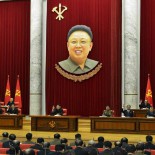Hu Jintao meets KWP Official & Sino Morningstar Protest
POST SCRIPT
Qin Gang, a spokesman for the Chinese Foreign Ministry, denies Asahi Shimbun‘s story or that Kim Jong-un ever visited China:
“China expects North Korea to pursue the development path appropriate to its national conditions, and accomplish new and greater achievements during the process of construction. China wishes to further promote the good-neighborly relationship between the two countries,” Foreign Ministry spokesman Qin Gang noted at a regular press briefing Tuesday.
Qin further dismissed certain media outlets’ persistent insinuation of China’s interference, saying “I repeatedly clarified last year that Kim Jong-un did not visit China.”
ORIGINAL
Chinese President Hu Jintao met Wednesday with Kim Yong-il, director of the KWP International Department. Mr. Kim’s visit to Beijing (where he also met with Wang Jiarui) follows up a trip last week by MOFA Vice Minister Kim Kye-gwan. It is also a strange opening act for US Special Representative Stephen Bosworth’s upcoming trip to northeast Asia.
Meanwhile, Ashai Shimbun reports that during the Spring of 2009, the Chinese expressed their displeasure with the DPRK’s hereditary succession plans and its missile and nuclear tests (Daily NK has an abbreviated summary of the report).
North Korea has appeared to soften its hardline attitude, sending General Secretary Kim Jong Il’s third son, Kim Chong-un, to China on a highly secret trip last year in June, indicating that it would return to the six-party talks on the DPRK’s nuclear programs, actively trying to court foreign investment, and so on. It is likely that the impetus for these moves came from pressure from China, North Korea’s biggest trade partner and donor country.
According to a North Korean official, the regime dispatched Chang Song-taek, Kim Jong Il’s brother-in-law and a member of the National Defense Commission, to China in early May last year to inform the Chinese side about the naming of Chong-un as the successor. Chang was sent again to China to explain about North Korea’s nuclear test at the end of May, but this time he was met only by Wang Jiarui, head of the CPC’s International Liaison Department, who made the three Chinese requests mentioned above to Chang.
According to a diplomatic source in Beijing, the Chinese side canceled visits by high-level government officials and official delegations to the DPRK and forced some North Korean researchers and staff received by Chinese companies and universities to return to North Korea. The Chinese print media ran articles critical of North Korea, the Huanqiu Shibao, a sister publication of the Renmin Ribao, pointedly saying to North Korea, “Don’t play with more dangerous fire.” “China has never shown such a strong reaction up to now,” confessed a North Korean official in Beijing.
This account alleges Kim Jong-un footstepped over to Beijing as part of a KPA delegation escorting Jang Song-thaek in June 2009. After Jong-un and Mr. Jang met with Chinese officials, objections to the succession were lifted and the educational exchanges resumed.
This report is difficult to verify, and comes with the usual salty caveats. There have been previous reports of Chinese and Russian objections to DPRK hereditary succession. There was also a rumor last summer of Jang Song-thaek traveling to Beijing with Kim Jong-un to introduce him to Chinese officials.


